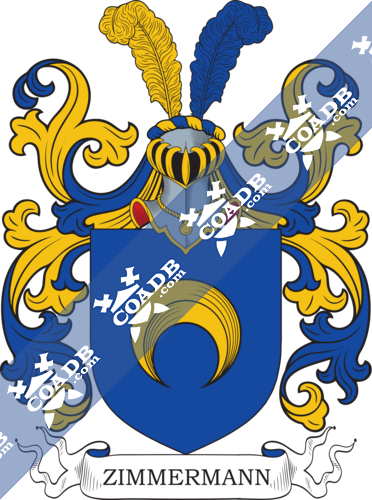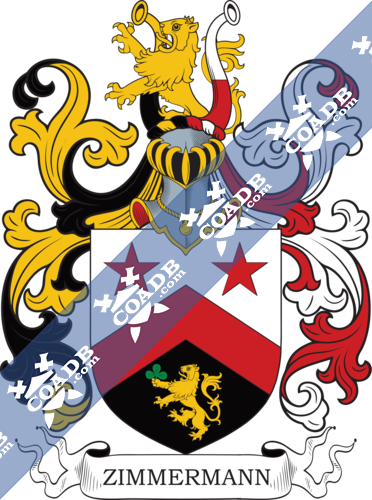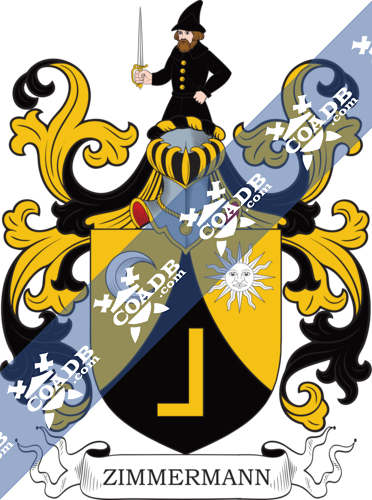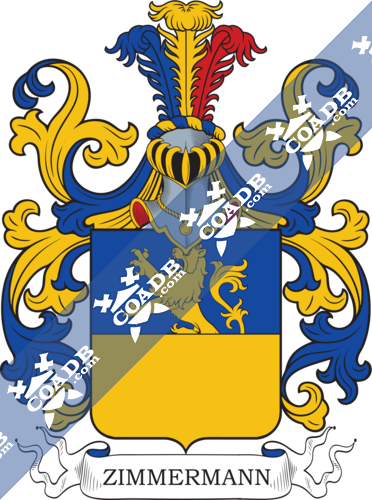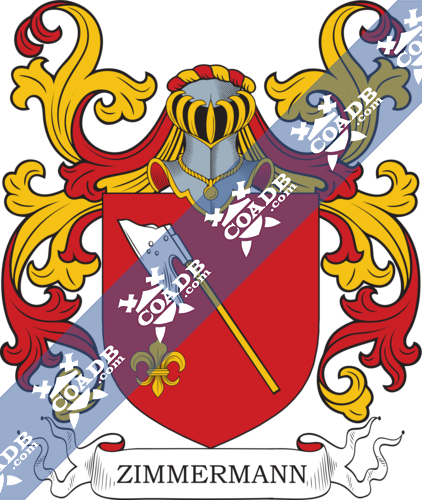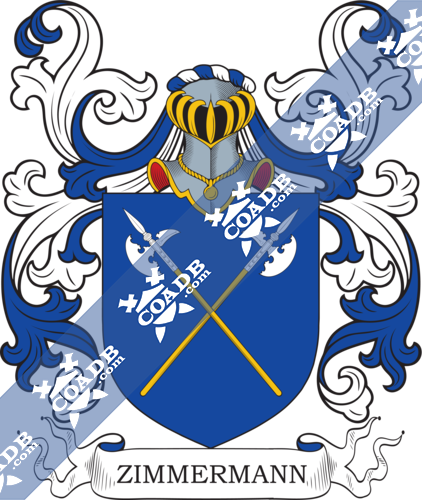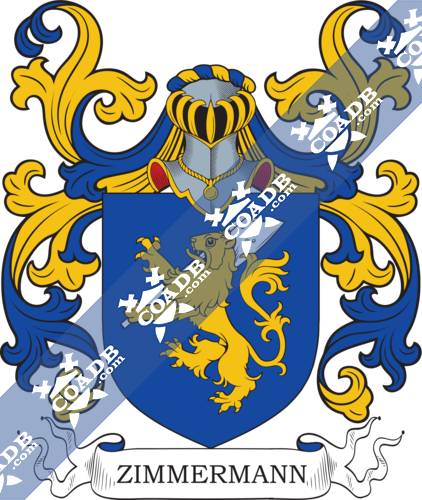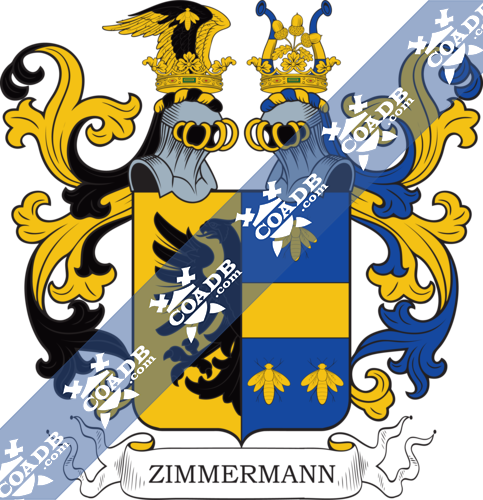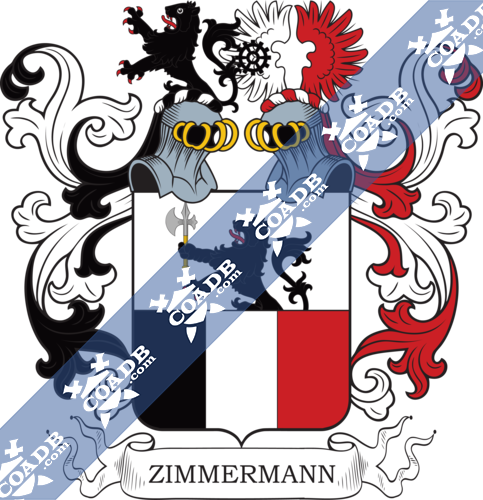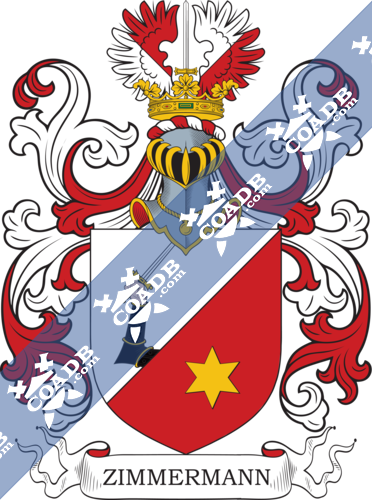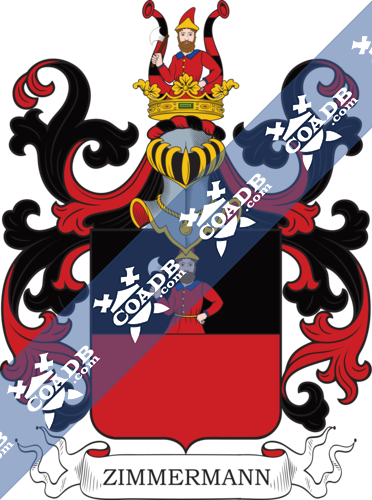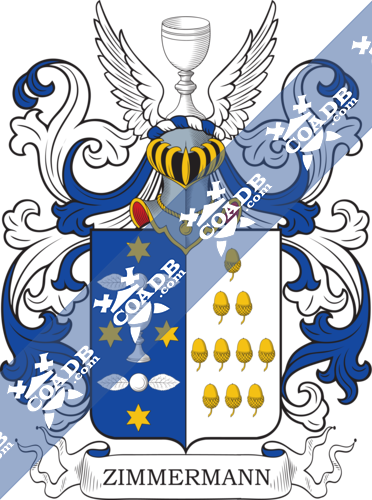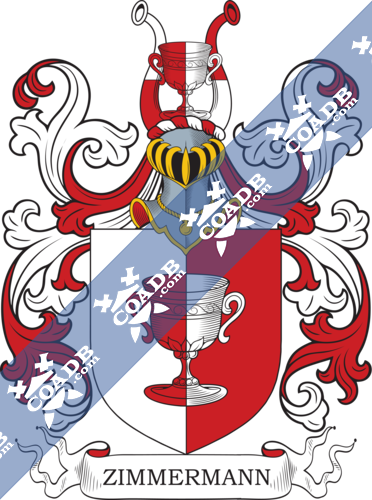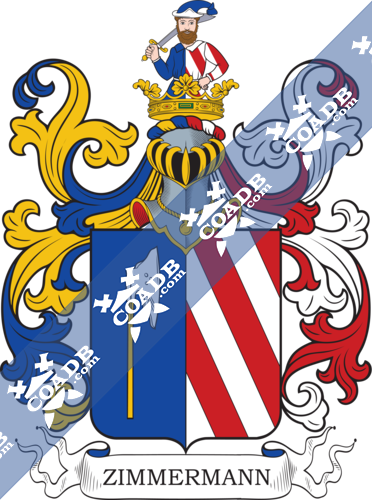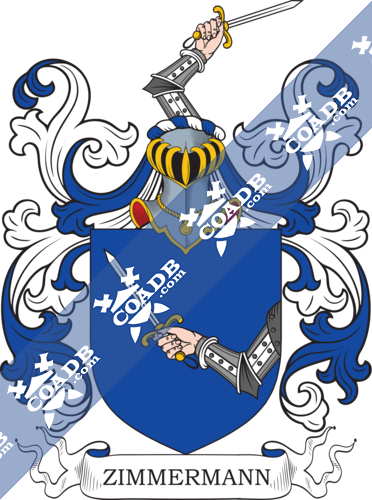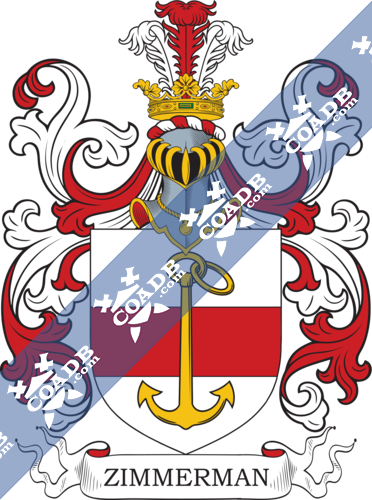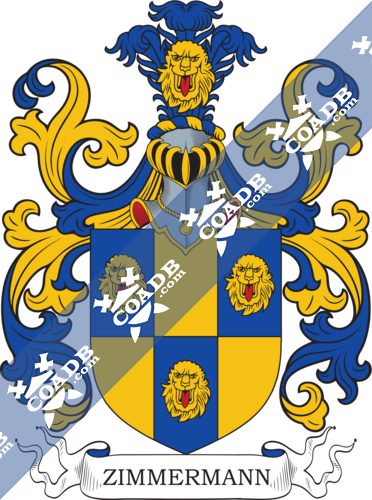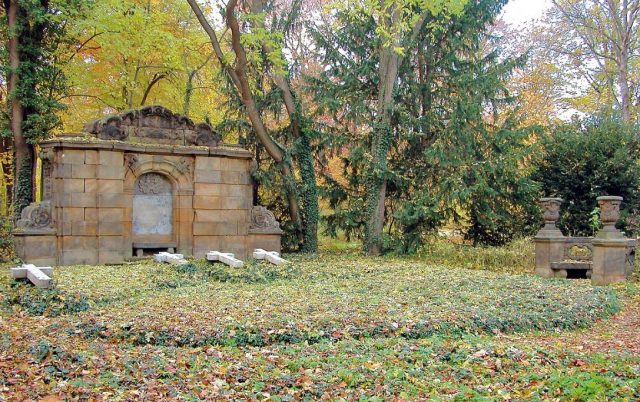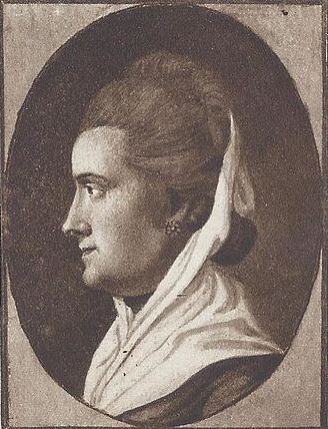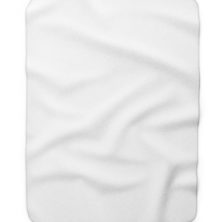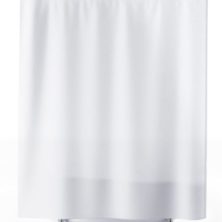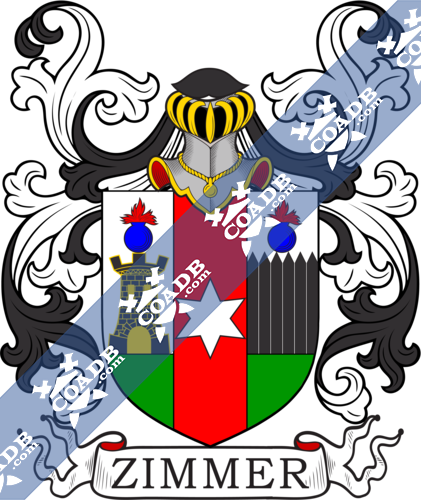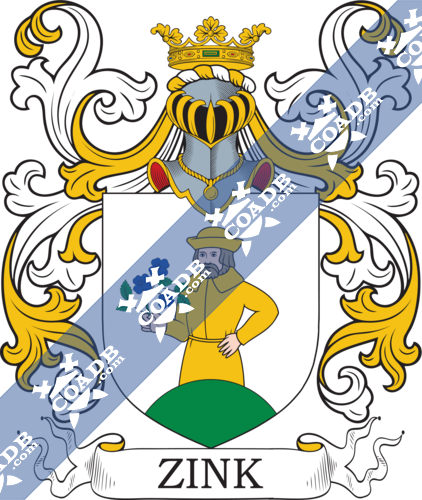Zimmerman Family Crest, Coat of Arms and Name History
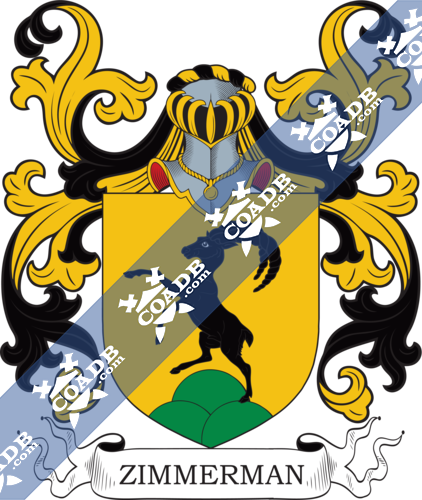
Zimmerman Coat of Arms Gallery
Don’t know which Coat of Arms is yours?
We can do a genealogical research. Find out the exact history of your family!
Learn MoreThe surname Zimmerman originated as an occupational surname in Germany. It means carpenter, one who works/builds with wood, deriving from the Middle High German word zimbermann, which consists of the words zimber (wood) or zimmer (room) and mann (man). Hence, it literally translates to “wood man” or “room man”. Carpentry was a critical trade in Europe and Christendom during medieval times and the Middle Ages. Some of their tasks or jobs included cutting down trees and timber, and using the wood to make fences, buildings, bailey castles, doors, furniture, wagons, and tools. The trade has to be studied for years and required some knowledge of math. Master carpenters were often hired by nobles, kings, and the clergy (Catholic Church). It was one of the first recorded surnames in Germany. Some claim the name was first found in Prussia (which contained parts of present-day Germany, Poland, Russia, Lithuania, Denmark, Belgium, Switzerland, and the Czech Republic).
Some early documented bearers of this surname include Cunrod Zimmermanin of Tailfingen (Charters of Balingen 1200 AD) and Heinricus Zimbermann (Zurich, Switzerland 1245 AD). Spelling variations include Simmerman, Zimmermann, and Timmerman (a Dutch variant).
I have identified one Zimmerman(n) family motto, the Latin phrase Labor ipse voluptas, which means “The pleasure is in the work itself”. This was also the motto of Leopold von Ranke (a German historian born in Wiehe, Saxony, Holy Roman Empire, in 1795).
In the United States, as of the 2000 Census, the surnames Zimmerman and Zimmermann rank 350 and 4,785, respectively. The former ranks particularly high in the following six states: Pennsylvania, Wisconsin, North Dakota, Kansas, Minnesota, and Nebraska. The name became popular in the British colonies in North America due to the fact that the Kings of Germany (House of Hanover) took over the English crown, at which point emigration to the colonies was highly encouraged and supported. This last name is also popular in several other countries: Germany (2,467th), Netherlands (1,499th), Canada (1,297th), South Africa (5,218th), Israel and (596th).
There are numerous notable or famous Zimmerman’s throughout history, including: 1) George J. Zimmermann (1882-1938) who was the mayor of Buffalo, New York in the 1930s, 2) Fred R. Zimmerman (1880-1954) was the 25th Governor of Wisconsin from 1927-1929, a Republican born in Milwaukee, 3) Henry Zimmerman (1887-1969), also known as “Heinie” or “The Great Zim”, was a professional baseball player born in New York City who played for the Chicago Cubs and New York Giants in the MLB from 1907 to 1919, 4) Robert Allen Zimmerman (1941), otherwise known as Bob Dylan, one of the most famous American musicians of all time, known for his 1960s social activism songs such as “Blowing in the Wind” and “The Times They Are-a-Changing”, 5) Ryan Zimmerman (1984) who is a professional baseball player born in Washington, North Carolina who played in the MLB from 2005-2018 for the Washington Nationals, and 6) Samuel Zimmerman (1815-1957) who was a Canadian railroad entrepreneur who was instrumental in the building of the Great Western Railway, born in Pennsylvania.
Some of the first members of this historic family to come to colonial America include John Jacob Zimmerman (New York 1710), Abraham Zimmerman (Pennsylvania 1727), Andreas Zimmerman (Pennsylvania 1727), Michael Zimmerman (Pennsylvania 1727), and Nicol Zimmerman (Pennsylvania 1732).
A one Georg Zimmermann was born in Halle, Saxony-Anhalt in 1527. He worked as a deputy headmaster of the school in Halle and was made pastor in 1574. He was said to be fond of astrology. He had the following children: Georg, Martha, and an unknown child.
A one Michael Zimmermann was born in Wolfschlungen, Esslingen, Germany in 1546. He had a daughter named Anna. Anna was born in 1565. She married Georg Merkle in 1591 and had a daughter with her named Anna Merkhlin.
Christianus Zimmerman was born in Dettingen, Baden-Wurttemberg in 1623. He married twice: Barba Hauser and Anna Kaupp. He had three issue: Catharina, Maria, and Christian. This Christian Zimmermann was born in Dettingen, Rottenburg in 1654. He married Catharina Blaess and had the following children with her: Anna Maria (Kleinmayer), Martin, Catharina, Eva (Mayer), and George Mathias. His son George Mathias was born in Betra, Hohenzollern, Prussia in 1689. He married Anna Dorthe Crumm. He came to colonial America where he died in Berks, Pennsylvania around 1740. He had two sons: Herman and Matheus. His son Herman Zimmerman was born in Rockland, Berks, Pennsylvania in 1733. He married Susanna Bornman and had the following issue with her: Susannna, Harmonious, Daniel, Henry, Barbara, Catherine, Jacob, and Christian.
To receive a complete surname meaning report by PDF you can order our SURNAME MEANING PACKAGE for $129. This report is great to share with family and friends. It includes everything you see above plus any other information we can find on the specified surname. It does take approximately 10 to 15 days for us to complete this custom report.
To receive a direct lineage & coat of arms search for your specific line(s) you can order one of our GENEALOGY PACKAGES ranging in price from $249 to $999. All research is completed by a professional genealogist with over 30 years’ experience. All reports and coat of arms files are sent by email in PDF and JPG format.
Blazons & Genealogy Notes
1) Fribourg – D’or à un bouquetin rampant de sable soutenu d’un tertre de trois coupeaux de sinople
2) Prusse – (An., 15 nov. 1786) – D’argent à la fasce de gueules à une ancre d’or sans trabe brochant sur la fasce Casque couronné Cimier trois plumes d’autruche une de gueules entre deux d’argent Lambrequin d’argent et de gueulesEnglish: Argent a fess gules with an anchor or without beam [of an anchor] covering over the fess Crowned with a helmet Crest: three ostrich feathers one gules between two argent Mantling: argent and gules.
3) Saxe – (Chevaliers autrichiens, 25 janv. 1877) – Coupé au 1 d’argent au lion naissant de sable armé et lampassé de gueules mouv du coupé tenant de ses pattes une hache au naturel emmanchée d’or au 2 tiercé en pal de sable d’argent et de gueules Cimiers 1° le lion issant Lambrequin d’argent et de sable 2° un vol à l’antique d’argent et de gueules l’aile d’argent ch d’une roue de moulin de sable Lambrequin d’argent et de gueules Devise LABOR IPSE VOLUPTASEnglish: Per fess 1st argent a lion naissant sable armed and langued gules coming from per fess holding in its paws an axe proper handle or 2nd tierced [tripled] palewise sable argent and gules Crests: 1st the lion issuant Mantling: argent and sable 2nd a pair of wings with ancient argent and gules the wing argent charged with a mill wheel sable Mantling: argent and gules Motto: LABOR IPSE VOLUPTAS.
4) Livonie, Esthonie – (Nob. du St-Empire, 31 mars 1550; naturalisé en Suède, 11 oct. 1672; inc. dans la nob.: de Livonie, 1730; de Russie, 13 sept. 1778: d’Esthonie, 3 fév. 1780) – Palé contre-palé d’azur et d’or de trois pièces les trois pièces d’azur ch chacune d’une tête de léopard d’or lampassée de gueules Cimier une tête de léopard d’or lampassée de gueules devant trois plumes d’autruche d’azur (Autrefois une branche de cette fam qui est originaire de Bruxelles était établie à Amsterdam sous le nom de Timmerman)English: Paly contre paly azure and or of three pieces the three pieces azure charged with each a head of a lion passant guardant or langued gules Crest: a head of a lion passant guardant or langued gules in front of three ostrich feathers azure.
5) Neufchâtel – (Tripet) – D’azur à un croissant contourné d’or Cimier deux plumes l’une d’or l’autre d’azurEnglish: Azure with a crescent reversed or Crest: two feathers the first or the other azure.
6) Valais – D’azur au lion d’or tenant de sa patte senestre une hache d’argent passant derrière son corps en barre le tranchant à senestreEnglish: Azure a lion or holding in its paws sinister an axe argent passant behind its body bendwise sinister the cutting edge to the sinister.
7) Vienne – Divisé en chevron d’argent sur sable au chevron de gueules brochant sur la division l’argent chargé de deux étoiles de gueules et le sable d’un lion d’or tenant un trèfle de sinople Cimier le lion rampant entre deux proboscides coupées à dextre d’or sur sable à senestre d’argent sur gueules Lambrequin conformes aux émaux des proboscidesEnglish: Per chevron argent over sable a chevron gules covering over the division the argent charged with two etoiles gules and the sable a lion or holding a trefle vert Crest: the lion rampant between two proboscides per fess to the dexter or over sable to the sinister argent over gules Mantling: conforming to the [same as] colours of proboscides.
8) Schweinfurt (Bavière) – De sable à une équerre d’or la traverse en haut le champ chapé-ployé d’or ch à dextre d’un croissant contourné d’argent et à senestre d’un soleil du même Cimier un homme issant habillé de sable coiffé d’un chapeau du même tenant une épée haute Lambrequin d’or et de sableEnglish: Sable with a carpenters square or the length upwards the field chape ploye [division top centre curved to dex & sin base] or charged with to the dexter a crescent reversed argent and to the sinister a sun of the same Crest: a man issuant dressed sable wearing on the head a hat of the same holding a sword upwards Mantling: or and sable.
9) Silésie – (An., 8 janv. 1598) – Coupé au 1 d’azur au lion naissant d’or mouv du coupé au 2 d’or plein Cimier trois plumes d’autruche d’azur d’or et de gueulesEnglish: Per fess 1st azure a lion naissant or coming from per fess 2nd or plain [uncharged] Crest: three ostrich feathers azure or and gules.
10) Grand-duché de Hesse – (An., 29 mars 1882) – Taillé au 1 d’argent à un senestrochère armé de sable liseré d’or tenant une épée d’argent garnie d’or en barre la partie supérieure du bras jusqu’au coude cachée à demi par le taillé dont il semble sortir au 2 de gueules à une étoile d’or Casque couronné Cimier une épée d’argent garnie d’or en pal entre un vol l’aile dextre tranchée de gueules sur argent l’aile senestre taillée d’argent sur gueules Lambrequin d’argent et de gueulesEnglish: Per bend sinister 1st argent with a left arm armoured sable edged or holding a sword argent hilt and pommell or bendwise sinister the upper part of the arm up to the elbow half hidden by the per bend sinister from[?] which it seems to be coming out 2nd gules with an etoile or Crowned with a helmet Crest: a sword argent hilt and pommell or palewise between a pair of wings the wing dexter per bend gules over argent the wing sinister per bend sinister argent over gules Mantling: argent and gules.
11) Autriche – (Chevaliers, 14 sept. 1882) – Parti au 1 d’or à la demi-aigle de sable mouv du parti au 2 d’azur à la fasce d’or acc de trois abeilles du même 1 en chef et 2 en pointe Deux casques couronnés Cimiers 1° un vol contourné l’aile de devant de sable ch d’une abeille d’or les plumes extérieures du même l’aile de derrière d’or plein aux plumes extérieures de sable Lambrequin d’or et de sable 2° une branche de chêne de deux feuilles et trois glands d’or entre deux proboscides d’azur ch chacune d’une fasce d’or Lambrequin d’or et d’azurEnglish: Per pale 1st or with a demi eagle sable coming from the partition [pale] 2nd azure a fess or accompanied by three bees of the same 1 in chief and 2 in base Crowned with two helmets Crests: 1st a pair of wings reversed the wing the front sable charged with a bee or the outer feathers of the same the wing of the rear or plain [uncharged] the outer feathers sable Mantling: or and sable 2nd a branch of oak of two leaves and three acorns or between two proboscides azure charged with each a fess or Mantling: or and azure.
12) Autriche – (Conf. de nob., 29 juillet 1733) – Coupé au 1 de sable à un homme issant posé de front habillé de gueules boutonné d’or rebrassé d’azur au rabat du même ceint d’un ruban flottant d’or coiffé d’un chapeau pointu de gueules retroussé d’or tenant de sa main dextre une hache d’argent emmanchée au naturel la main senestre appuyée sur la hanche au 2 de gueules plein Casque couronné Cimier l’homme de l’écu issant entre deux proboscides fascées de gueules et de sable de six pièces Lambrequin de gueules et de sableEnglish: Per fess 1st sable with a man issuant placed facing forwards dressed gules buttoned or turned back [of cuffs etc.] azure with flaps of the same belted a ribbon flying or wearing on the head a hat pointed gules turned up or holding in his dexter hand an axe argent handle proper the hand sinister resting on the hip 2nd gules plain [uncharged] Crowned with a helmet Crest: the man of the shield issuant between two proboscides barry gules and sable of six pieces Mantling: gules and sable.
13) Allemagne, Hollande, Amérique du nord – Parti au 1 d’azur à un calice de fleur d’argent acc de deux paires de feuilles dentelées du même 1 en chef et 1 en pointe les deux feuilles de chaque paire posées horizontalement et mouv d’une petite boule le tout acc de quatre étoiles d’or 1 au point du chef surmontant la première paire de feuilles 2 accostant le calice et 1 en pointe au-dessous de la seconde paire au 2 d’argent à treize glands effeuillés d’or 1 2 3 4 et 3 les queues en bas Cimier le calice du 1 entre un vol d’argentEnglish: Per pale 1st azure with an flowered chalice argent accompanied by two pairs of leaves indented [on one edge] of the same 1 in chief and 1 in base the two leaves of each pair placed horizontally and coming from a small ball all accompanied by four etoiles or 1 of chief point surmounted by the first pair of leaves 2 either side of the chalice and 1 in base above of the second pair 2nd argent with thirteen acorns leafless or 1 2 3 4 and 3 the tail downwards Crest: the chalice of the 1st between a pair of wings argent.
14) Alsace, Rappersweil – Parti d’argent et de gueules à un double hanap de l’un en l’autre Cimier un calice parti de gueules et d’argent entre deux proboscides coupées alternativement d’argent et de gueulesEnglish: Per pale argent and gules a double handled drinking cup counterchanged Crest: a chalice per pale gules and argent between two proboscides per fess alternately argent and gules.
15) Bavière – (Nob. du St-Empire, 13 juin 1629) – Parti au 1 d’azur à une hache d’argent emmanchée d’or posée en pal le tranchant à senestre au 2 bandé de gueules et d’argent Casque couronné Cimier un homme issant habillé aux armes de l’écu (sans hache coiffé d’un chapeau à larges bords tenant une épée sur son épaule le tranchant en haut Lambrequin à dextre d’or et d’azur à senestre d’argent et de gueules (Comtes du St-Empire 25 août 1790) Parti au 1 d’argent à trois bandes de gueules au 2 coupé a d’or à un bouc de sable sur un tertre de trois coupeaux d’azur b d’azur à une hache d’argent emmanchée d’or posée en pal Bourlet d’azur et d’argent Cimier un homme issant habillé d’un parti d’argent et d’azur l’argent chargé de trois bandes de gueules coiffé d’un chapeau piramidal d’azur ch de deux bandes d’argent et tenant de sa main senestre une hache d’argent emmanchée d’or le tranchant à senestreEnglish: Per pale 1st azure with an axe argent handle or placed palewise the blade to the sinister 2nd bendy gules and argent Crowned with a helmet Crest: a man issuant dressed with the arms of of the shield ( without axe wearing on the head a hat with large edge holding a sword over his shoulder the blade upwards Mantling: to the dexter or and azure to the sinister argent and gules Alternatively, per pale 1st argent three bendlets gules 2nd per fess a) or with a goat sable on a hillock of three peaks azure b) azure with an axe argent handle or placed palewise wreath on the helmet azure and argent Crest: a man issuant dressed a per pale argent and azure the argent charged with three bendlets gules wearing on the head a pointed hat azure charged with two bendlets argent and holding in its hand sinister an axe argent handle or the blade to the sinister.
16) Brandebourg – (Chevaliers en Bohème, 27 janv. 1710) – D’azur à un senestrochère armé tenant une épée le tout au naturel Cimier le meuble de l’écu Lambrequin d’argent et d’azurEnglish: Azure with a left arm armoured holding a sword all proper Crest: the charge of the shield Mantling: argent and azure.
17) Baden (Argovie) – De gueules à une hache d’argent emmanchée d’or posée en bande le fer en bas et à dextre acc d’une fleur-de-lis d’or posée au canton dextre de la pointeEnglish: Gules with an axe argent handle or placed bendwise the tip downwards and to the dexter accompanied by a fleur de lys or placed a canton dexter in the base.
18) Bâle – D’azur à deux hallebardes d’argent emmanchées d’or passées en sautoirEnglish: Azure two halberds argent handle or placed saltirewise.

